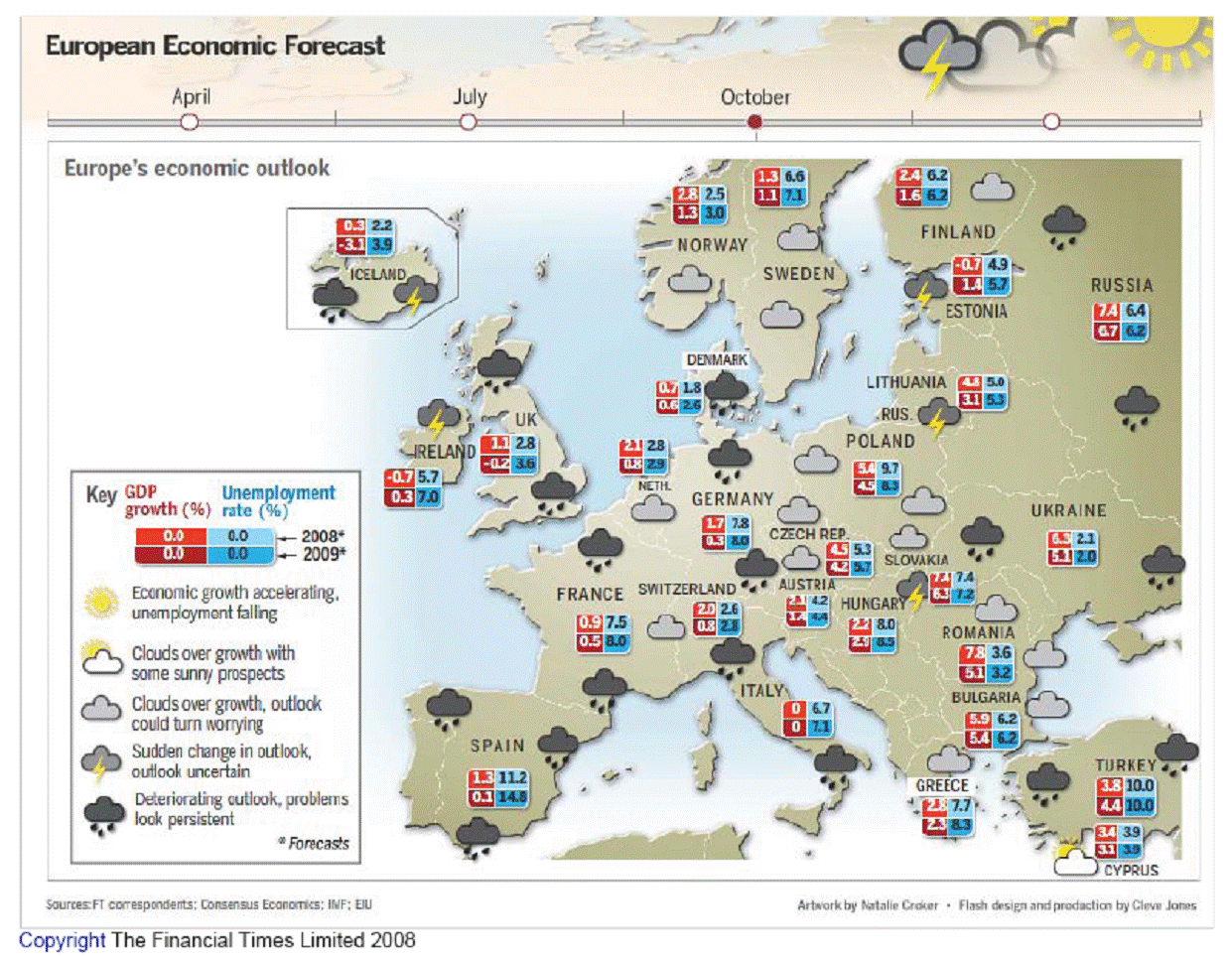From Europe’s Stormy Outlook:
Stormy conditions prevail across Europe’s economies, blackening the outlook after the arrival of a full-blown banking sector crisis this month sent confidence plummeting and threatened widespread-economic damage.
Jean-Claude Trichet, European Central Bank president, warned late on Sunday on French television of a “strong slowdown”.
The recent turmoil has hardened expectations that 2009 will see little, if any, growth across much of the Continent.
…

Figure from Europe’s Stormy Outlook.
Those unemployment rates seem strange, unless I’m misreading the map. 2.8% for the UK? That seems way off from what the National Statistics reports(http://www.statistics.gov.uk/cci/nugget.asp?id=12).
Solution: Move to Cyprus
Steven:
You’re right: way off for Britain (unemployment 5.7% last month); for Holland (netherlands)—3.8%, though not seasonally adjusted; for Belgium 11.2% and not seasonally adjusted. Possibly some others in the eurozone — I stopped counting — though the unemployment rates for Germany, Spain, France, and Italy seem sound.
Source: The Economist, Oct 16th, 2008. Click here if you can access the online site (requires registration): http://www.economist.com/markets/indicators/displaystory.cfm?story_id=12429596
…..
Denmark’s extraordinarily low unemployment — listed as a staggeringly low 1.6% in August reflects, most likely, its job retraining programs and a fairly large number of out-of-work persons in them. At any rate, a Eurostat publication put it at 3.2% this summer . . . still very impressive, mind you.
…..
What’s gone on in the EU the last few years, to generalize only about West European members, is a sustained effort everywhere to create more flexible labor markets.
To that end, there has been a crackdown on the length of unemployment insurance — with a need after a certain period of time (in Germany and France, I believe, 1 year) to take a minimum wage job funded by the government. (I add that France’s policies seem to waver.)
There have also been efforts to relax minimum wages for certain youths, efforts to make overtime hours more flexible (and in France to dilute the 35-hour official work-week), and efforts to create a lot of part-time work. The latter, even if involuntary — the job-holders wanting a full-time job — has also proliferated the last few years too.
Similarly, in some countries, welfare payments have been reduced for those whose unemployment runs out and who aren’t required to take a minimum-wage job (whether private or public).
…..
One of the consequences of these labor-market policies has been that the EU-15 have begun to duplicate the US trade-off in the late 1970s until the mid- and late 1990s: the Europeans have, to be specific, been adding workers at the expense of growth in labor productivity.
A good study by Robert Gordon of Northwestern and a British Ph.D. student at Harvard, published last April, documented this trade-off effectively in the EU. As their study noted, only the US — among the advanced industrial countries — has seen a big rise in multi-factor productivity and labor-productivity thanks to the Internet and business-to-business as well as business-to-end consumer activity . . . as well, presumably, for the creation of companies like Amazon and Yahoo and Ebay.
Study found at Vox: http://www.voxeu.org/index.php?q=node/1058
……
Michael Gordon, AKA, the buggy professor
US unemployment rate is at 12%. Forget the BLS hogwash.
Say it again! -12% -12% 12%!